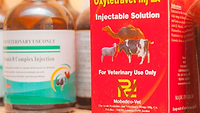Codex-Based Effort to Mitigate Foodborne AMR Underway in Six Countries

Credit: Gabriel Porras (gabrielizalo) via Unsplash
Six nations—Bolivia, Cambodia, Colombia, Mongolia, Nepal, and Pakistan—have assessed their performances in minimizing and containing foodborne antimicrobial resistance (AMR). The work was done as part of the Food and Agriculture Organization of the United Nations’ (FAO’s) ACT project, financed by the Republic of Korea, which aims to support the global implementation of Codex Alimentarius texts on AMR.
To improve the implementation of Codex texts on AMR, FAO emphasized identifying gaps and preparing action plans. To evaluate their situations, five of the six countries used the FAO AMR Progressive Management Pathway (PMP) tool, while Nepal used the Codex Code of Practice (COP) tool.
Both tools aim to determine a clear set of actions that can help countries move forward in their efforts to address foodborne AMR, but they were developed for different purposes. PMP comprises two parts: an assessment of a country’s AMR National Action Plan (NAP), and an evaluation of the level of implementation of the NAP. Meanwhile, the Codex COP tool assesses a country’s level of implementation of the Codex Code of Practice to Minimize and Control Foodborne AMR.
One of the biggest challenges faced in the assessment process was the mapping of stakeholders covering a range of sectors. Regardless, the assessment process went smoothly, according to FAO, and the next step is to execute action plans. Each country has a detailed report of their status regarding AMR and antimicrobial use, which includes a list of necessary actions, stakeholders that could execute the actions, and a rough timeline of when the tasks could be completed.
Although each country’s situation with AMR and antimicrobial use is unique, FAO found a general need to increase awareness of the issue among all concerned stakeholders. In addition, there is a need to train animal producers on AMR mitigation strategies, such as biosecurity or good husbandry practices. FAO also found gaps in the surveillance of microorganisms exhibiting AMR, especially in the environment and in crop production.
Finally, there are hurdles to overcome in the effort to stop the use of growth promoters in the animal production sector. FAO saw a lack of capacity to implement prescription requirements to access antimicrobials.
Looking for a reprint of this article?
From high-res PDFs to custom plaques, order your copy today!






